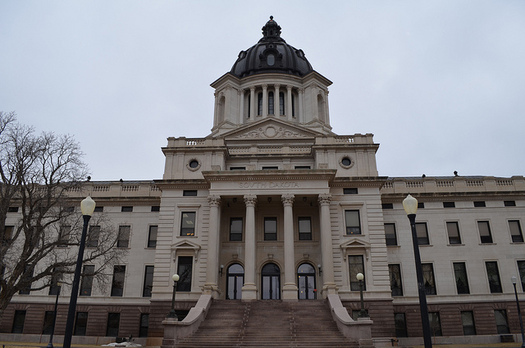
- Details
- By Darren Thompson
PIERRE, S.D. — Democrats Shawn Bordeaux and Peri Pourier, along with Republican Tamara St. John, were each re-elected for an additional term in South Dakota’s House of Representatives in yesterday’s election. Red Dawn Foster and Troy Heinert, both Democrats, were re-elected to the South Dakota State Senate.
All of the state lawmakers are from tribes in South Dakota.
Bordeaux has served in the House of Representatives since 2015 and represents District 26, which includes the Rosebud Indian Reservation. He is Sicangu Lakota.
Both Foster and Pourier represent District 27, which includes Oglala Lakota County and part of Pennington County in southwestern South Dakota. Both were first time-elects in 2018. They’re both Oglala Lakota.
Early poll results show that Oglala Lakota County carried the winning vote for both candidates.
“It is very humbling to be chosen to represent the Oyate again,” State Rep. Peri Pourier told Native News Online. “It motivates our passions to fight for the Native voice in critical times and it’s an honor I’ll carry proudly.”
“Wopila tanka for your love, support and vote in these pandemic times” said State Sen. Red Dawn Foster in a Facebook post. “I am humbled and honored to once again represent our voice at the South Dakota Legislature!”
The South Dakota House of Representatives is the lower house of the South Dakota State Legislature and is made up of 70 members with two from each legislative district.
St. John represents District 1, which includes the Sisseton Wahpeton Oyate Reservation in Northeastern South Dakota. St. John is enrolled with the Sisseton Wahpeton Dakota Tribe and has been in office since 2018 as well.
“I believe it’s clear that Disctrict 1 supports hard work and continued effort to bring Native American representation to Pierre,” said South Dakota Rep. Tamara St. John. “The numbers were amazing here (in District 1).”
In their first term together, all three Representatives were able to successfully pass Senate Bill 164, which lays out guidelines for law enforcement officers to handle and report on cases of missing and murdered Indigenous persons. It requires the Division of Criminal Investigation to disseminate uniform guidelines on reporting and investigating cases of missing and murdered Indigenous persons to law enforcement agencies throughout South Dakota.
Sen. Heinert (Rosebud Sioux) won re-election to the state Senate in District 26, He beat his challenger Joel Koskan 53 percent to 47 percent
South Dakota’s District 27’s veteran state senator, Kevin Killer, opted out of state politics and campaigned as a candidate for the Oglala Sioux Tribal President in this year’s general election. He previously served as District 27’s Representative from 2009 to 2017, and as the district’s state Senator from 2017 to 2019. He is anticipated to become the next president for the Oglala Sioux Tribe.
However, another initiative was voted on that could drastically affect tribes in the state. Voters have approved efforts to legalize both recreational and medical marijuana use in South Dakota.
“The State Legislature has a lot of work to do to see if IM26 will drastically affect current state laws,” Rep.Pourier said. “With the both Oglala Sioux Tribe and the State legalizing both recreational and medical marijuana, I'm hoping a new paradigm will shift when analyzing the benefits and risks of marijuana use.”
South Dakota is the only state in the country that criminalizes ingestion of marijuana as a felony crime.
Earlier this year, the Oglala Sioux Tribe voted to legalize the use of medical and recreational marijuana, but because of the pandemic progress has been stalled.
“There is a great deal that needs to happen on every legislative level,” Rep. St. John commented. “The voice of the people is a powerful thing and it will take work to create and pass the sort of legislation needed to implement it (IM26).”
Initiated Measure 26 (IM26) will legalize the medical use of marijuana if the legislature creates laws regulating its use. Per state law, each initiated measure won’t be in effect until July 1, 2021.
South Dakota is the first state ever to approve medical and recreational marijuana measures at the same time. Currently, there are 11 states that have legalized the use of recreational marijuana for adult consumption.
Governor Kristi Noem and the state Legislature could overturn IM26 as the state did in 2017 with IM22. The Rapid City Journal reported that Noem said she opposed IM26.
“I encourage everyone to contact their legislators and share their voice,” added Rep. Pourier.
More Stories Like This
Native News Weekly (August 25, 2024): D.C. BriefsNavajo Nation Mourns the Passing of Former Vice President Rex Lee Jim
Deb Haaland Earns Endorsement From Communications Workers of America Local 7076
University Soccer Standout Leads by Example
Two Native Americans Named to Democratic Congressional Campaign Committee's“Red to Blue” Program
Help us defend tribal sovereignty.
At Native News Online, our mission is rooted in telling the stories that strengthen sovereignty and uplift Indigenous voices — not just at year’s end, but every single day.
Because of your generosity last year, we were able to keep our reporters on the ground in tribal communities, at national gatherings and in the halls of Congress — covering the issues that matter most to Indian Country: sovereignty, culture, education, health and economic opportunity.
That support sustained us through a tough year in 2025. Now, as we look to the year ahead, we need your help right now to ensure warrior journalism remains strong — reporting that defends tribal sovereignty, amplifies Native truth, and holds power accountable.
 The stakes couldn't be higher. Your support keeps Native voices heard, Native stories told and Native sovereignty defended.
The stakes couldn't be higher. Your support keeps Native voices heard, Native stories told and Native sovereignty defended.
Stand with Warrior Journalism today.
Levi Rickert (Potawatomi), Editor & Publisher
